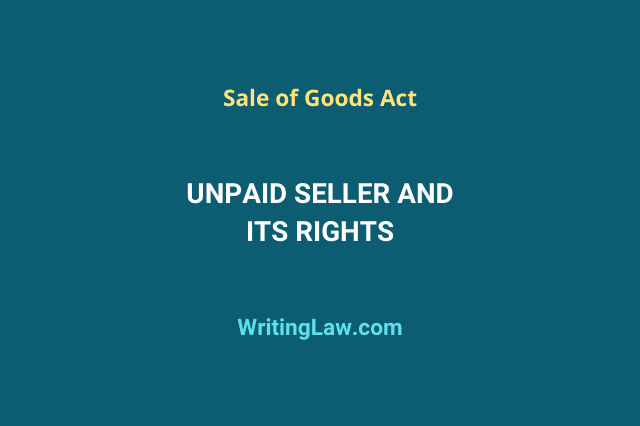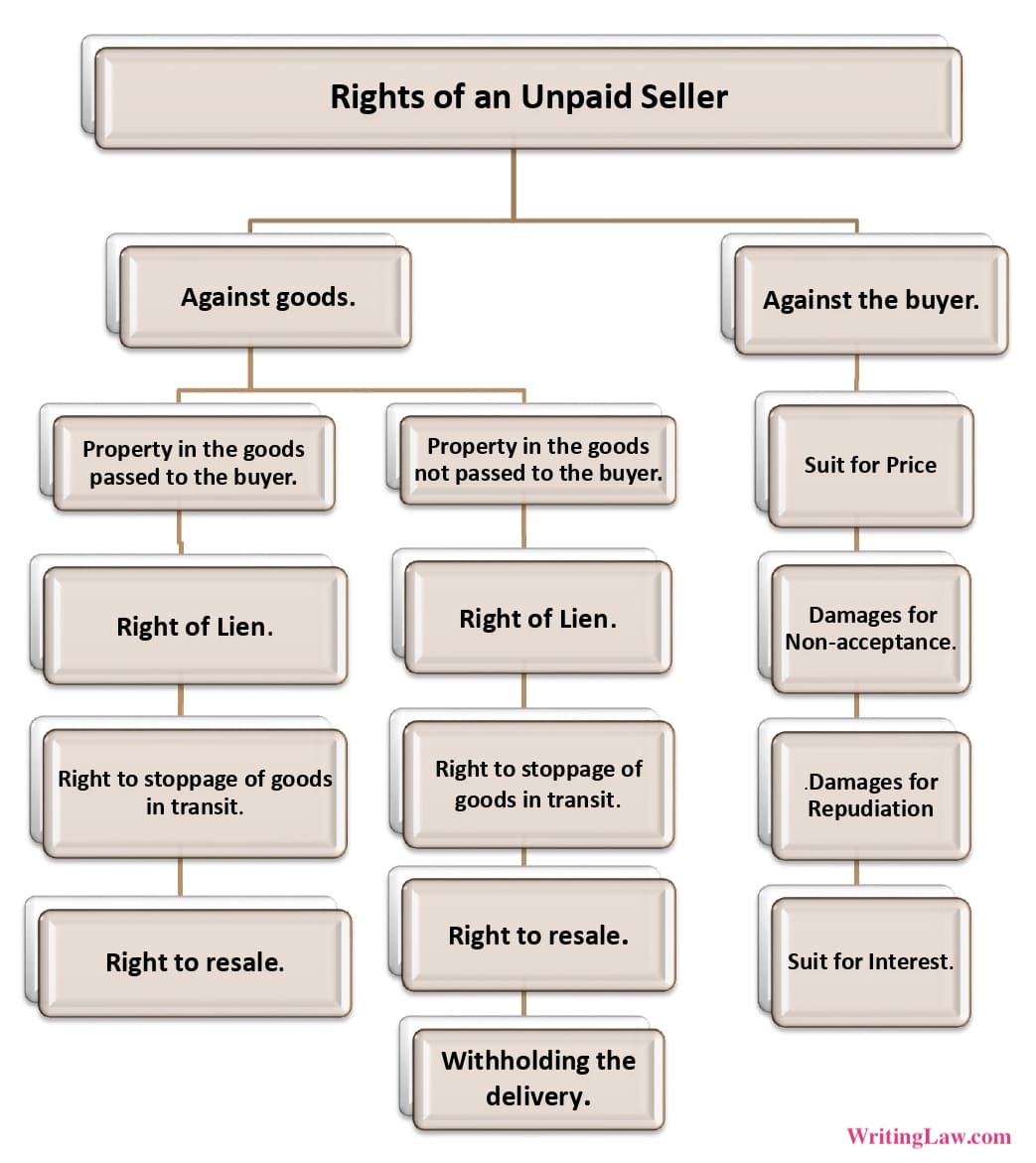
Chapter V of the Sale of Goods Act, 1930, deals with unpaid sellers. In a contract of sale, the seller is under an obligation to deliver the goods, and the buyer has to pay for it. If the buyer fails or refuses to pay, such a seller becomes an unpaid seller.
This law article discusses the meaning and rights of an unpaid seller given under the Sale of Goods Act, 1930 (SOGA).
Meaning of Unpaid Seller
According to section 45(1) of the Sale of Goods Act, 1930, a seller of goods is called an “unpaid seller”, when:
- The price has not been paid or tendered, or
- A bill of exchange or other negotiable instruments (like a cheque) that was received as conditional payment has been dishonoured.
Section 45(2) expands the definition of a seller to include anyone in the position of a seller (for example, the agent of the seller to whom the bill of lading is endorsed, or a consignor or agent who has paid or is directly responsible for the price).
Example 1: X sold some goods to Y for Rs 10,000. Y paid Rs 9,900 but failed to pay the balance of Rs 100. X becomes an unpaid seller.
Example 2: X sold some goods to Y for Rs 5,000 on a cheque for the price as a conditional payment. On presentation, the bank dishonoured the cheque. Here also, X becomes an unpaid seller.
Rights of an Unpaid Seller

We can broadly classify the rights of an unpaid seller under the following two categories:
I. Rights against goods.
II. Rights against the buyer personally.
I. Rights Against Goods
Section 46 of the Sale of Goods Act addresses the rights of an unpaid seller whose property in the goods has not yet been transferred to the buyer. The unpaid seller has the following 3 + 1 = 4 rights:
- Right of lien
- Right of stoppage of goods in transit
- Right to resale the goods
- Withholding delivery (When the possession of the goods has not passed to the buyer, the unpaid seller has an additional right of withholding delivery besides the three rights outlined above.)
Here’s more about these four rights one by one.
1. What Is the Right of Lien
The right of lien means the right to keep possession of the goods until the seller receives the due price.
Section 47 of the Sale of Goods Act provides that an unpaid seller (as agent or bailee of the buyer) in possession of the goods has the right to keep possession of the goods until payment or tender of the price in the following cases:
- Where the goods have been sold with no stipulation to credit, or
- Where the goods have been sold on credit, but the term of credit has expired, or
- Where the buyer becomes insolvent.
Further, section 48 of the Sale of Goods Act provides that despite the partial delivery of goods by the unpaid seller, section 48 authorizes him to exercise his lien right on the rest.
In Grice vs Richardson (1877), the sellers had delivered a portion of the three bags of tea under a contract of sale but had not been paid for the rest. Therefore, they could keep them until the buyer paid the price.
Termination of Lien
The unpaid seller of the goods loses his right of lien in the following cases:
- When he delivers the goods to a carrier or other bailee for delivery to the buyer without reserving the right of disposal of the goods, or
- When the buyer or his agent lawfully gets possession of the goods, or
- When the seller waives his right of lien, or
- When the buyer disposes of the goods by sale or in any other manner with the consent of the seller, or
- Where a document of title to goods has been issued or lawfully transferred to any person as buyer or owner of the goods, and the buyer then transfers the document by sale to someone taking it in good faith and for consideration.
2. What Is Right to Stoppage of Goods in Transit
The unpaid seller delivered the goods to the carrier for transmission to the buyer, and in the meantime, the buyer becomes insolvent, then the seller has the right to stop and retain the goods in transit. Thus, the unpaid seller resumes possession of the goods as long as it is in transit.
The unpaid seller can exercise the right of stoppage in transit only if he fulfils the following conditions:
- The seller must have parted with the possession of goods, i.e., the goods must not be in the seller’s possession.
- The goods must be in transit.
- The buyer must have become insolvent.
Duration of Transit
As per section 51 of the Sale of Goods Act, the goods are in transit when they are delivered to a carrier or bailee for transmission to the buyer and until the buyer or his agents, on his behalf, take the delivery of those goods.
The unpaid seller loses the right to stoppage in transit in the following cases:
- When the goods reach the destination, or
- If the buyer or his agent on his behalf receives the goods before they reach their destination, or
- If the carrier or other bailee admits to the buyer or his agent that he has the goods on his behalf and continues to possess them after the items arrive at the designated destination, the transit is complete, or
- If the carrier or other bailee wrongfully refuses to deliver the goods to the buyer or his agent on his behalf, or
- If they deliver part of the product to the buyer or his agent, the unpaid seller may hold the rest of the shipment in transit if the portion transfer does not enable the buyer to relinquish possession of the goods, or
- If the seller has consented to the sub-sale or other disposition with the buyer.
Section 52 of the Sale of Goods Act provides that the unpaid seller may exercise his right of stoppage in transit either:
- By taking the actual position of the goods, or
- By giving notice of his claim to the carrier or other bailee under whose possession the goods are.
3. What Is the Right to Resale the Goods
As per section 46(1) of the Sale of Goods Act, under the following circumstances, the unpaid seller may resell the goods, if the goods are:
- Of a perishable nature, or
- When the unpaid seller exercised his right to lien or stoppage in transit and gave notice to the buyer of his intention to resale.
We must note here that in such cases, on reselling the goods, it also entitles the seller to:
- Recover the difference between the contract price and the resale price from the original buyer as damage.
- Keep the profit if the resale price is higher than the contract price. But if the unpaid seller does not give any notice, that shall not entitle such unpaid seller to recover such damages, and the buyer can claim the profit on the resale.
4. What Is Withholding Delivery
As per section 46(2) of the Sale of Goods Act, where the property in goods has not passed to the buyer, the unpaid seller has, besides other remedies, a right to withhold the delivery.
II. Rights Against the Buyer Personally
It is also known as the seller’s remedy for the breach of a contract of sale. These rights are as follows:
Let us learn more about these four rights.
1. Suit for Price
As per section 55 of the Sale of Goods Act, if the property in the goods has passed to the buyer and he neglects or refuses to pay for it according to the contract, the seller may sue him for the price of the goods.
2. Suit for Damages for Non-acceptance
As per section 56 of the Sale of Goods Act, where the buyer wrongfully neglects or refuses to accept the goods and pay for the goods, the seller may sue him for damages for non-acceptance of the goods. For the measure of damages, section 73 of the Indian Contract Act, 1872 applies.
3. Suit for Damages for Repudiation of the Contract
As per section 60 of the Sale of Goods Act, if the buyer repudiates the contract before the due date for delivery, the seller may treat the contract as subsisting (maintain, survive, keep active) and wait until the due date of delivery or treat the contract as rescinded (revoke, cancel) and seek damages for the breach.
4. Suit for Interest
As per section 61(2) of the Sale of Goods Act, a seller may sue the buyer for interest or special damages in the event of a breach of contract while suing for an amount owed to him.
Read Next:
1. Sale Explained – Section 54 Transfer of Property Act
2. Rights and Duties of Bailor and Bailee – Contract of Bailment
- What Is Remission Under Criminal Law in India? - 12th November 2023
- What Is the Doctrine of Part Performance Under the Transfer of Property Act? - 4th September 2023
- What Is the Places of Worship Act, 1991 and Its Objectives? - 30th July 2023







